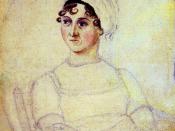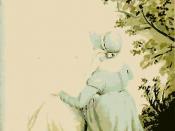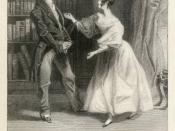Within the novel, Austen has used Jane and Mr. Bingley as the subplot to the book. Austen shows how Jane and Mr. Bingley need to get together before Elizabeth and Darcy could.
In chapter thirty three we see how Lizzy is speaking to Colonel Fitzwilliam. We see how he discusses with her how Mr. Darcy is in fact heroic because he saved a close friend from a bad marriage.
"...he congratulated himself on having lately saved a friend from
the inconveniences of a most imprudent marriage, but without mentioning
names or any other particulars, and I only suspected it to be Bingley from
believing him the kind of young man to get into a scrape of that sort..."
This quote shows irony because Colonel Fitzwilliam doesn't realise that he is discusses Jane, Elizabeth's sister. Colonel Fitzwilliam let Lizzy hear about how Mr. Darcy halted their marriage, without realising how well Lizzy knew Jane.
This chapter gives Austen the opening for Mr. Darcy to explain himself and why he stopped the marriage of Mr. Bingley and Jane Bennet. The chapter also fuels Lizzy's resentment towards Darcy and makes Lizzy even more aware of her strong feelings against Mr. Darcy.
"Elizabeth made no answer, and walked on,
her heart swelling with indignation."
This shows us how annoyed and how Lizzy had a lot of fury at this point at Darcy's behaviour; she is so cross because she feels like the readers that Mr. Bingley and Jane were a well matched couple, Austen made her character someone who the reader could relate with over this lost relationship. We see how Mr. Darcy feels very strongly about how Bingley should not marry down, we also know that Darcy feels strongly about marring down in status because of how he behaves around Lizzy. From chapter eleven we could see that Mr. Darcy had a likening towards Lizzy, but he never admitted it to anyone except for when he proposed to Lizzy for the first time in chapter thirty four.
In chapter thirty four, Lizzy can see how Mr. Darcy is against marring down, as when he proposes to her he lists all the reason why they are unsuited. Before Mr Darcy enters to propose to Lizzy, Lizzy decides to re-read the letters sent to her from Jane and by doing so her anger towards Darcy grows.
"Mr Darcy's shameful boast of what misery
he had been able to inflict gave her a keener
sense of her sister's sufferings."
We can also see in this chapter how much Darcy does care about his position and how marring beneath him will affect it, here we see how he tried not to fall in love with her.
"In vain I have struggled. It will not do. My feelings will not
be repressed."
Later we hear the reasons why they are not well suited and his position does come up, this shows us how after he broke Jane and Bingley's marriage up due to their positions, he is asking Lizzy for her hand in marriage after he has struggled to fight his personal barrier.
In chapter eleven we see how Darcy and Elizabeth's relationship develops. We see how Miss Bingley tries to impress Darcy but fails and then we see how without any trying Darcy is interested in Lizzy.
"He was as much awake to the novelty of
attention in that quarter as Elizabeth herself could be,
and unconsciously closed his book."
Although Lizzy still makes little sarcastic and other remarks towards Darcy, Darcy still seems to show an interest in her.
".."there are such people, but I hope I am not one of them.
I hope I never ridicule what is wise or good. Follies and nonsense,
whims and inconsistencies, do divert me, I own, and I laugh at them
whenever I can-But these, I suppose, are precisely what you are without.""
This shows us how Lizzy cannot help herself but be sarcastic towards Darcy, but Darcy responds in a very friendly manner. Chapter eleven all stems from when Lizzy went to visit her sick sister Jane, who went to Netherfield to visit Bingley.
Austen uses Jane and Bingley as a subplot to the novel and therefore we need them to resolve their problems and be happy together, before we can see the main plot (Elizabeth and Darcy) develop. We see that when Jane and Bingley are at their worse point in the novel, when Jane is in London hoping to see Bingley, that Elizabeth feels most resent towards Darcy. This shows us how the subplot is there to move the plot forwards.
Austen used Jane and Bingley in the novel to show to the reader that a romantic partnership is possible, we see how both Jane and Bingley get on with each other so well, they seem like a match from the very beginning of the novel and then throughout the novel we see how frustrating it is that they part. Austen shows us with the two characters that marriage and love isn't all negative, there are some relationships that work.
We know that it would have been difficult for Jane Austen to bring the characters together in the novel due to a lack of commutation the characters would have had with each other at the time, this is why we see Jane follow Bingley to London and just hope she'd meet him there, because there wouldn't have been many ways of her finding him at the time. Also at the time the novel was written we know that most people were polite to each other and didn't always say what they were thinking, this is why Bingley would have accepted what Darcy was saying about the marriage to Jane, that and the fact that Bingley is a very sincere character.
Austen in the novel explores a wide range of different marriages and therefore we get a chance to compare relationships such as Jane and Bingley with Darcy and Elizabeth, this is because Jane and Bingley act as a foil to the other relationship, also the Gardiners have a very equal marriage and both have equal respect for each other.
In the novel the subplot, Jane and Bingley getting together and then married, drives the plot on and therefore at the end of the novel we have two marriages.
Austen has created this subplot which shows us the ideal partnership, she has brought together two honest people in a marriage and then using the main plot she has created another very well suited marriage, which means the novels ending is a happy one.



Jane and Bingley
Submitting an essay twice is a waste of the reader's time.
5 out of 7 people found this comment useful.